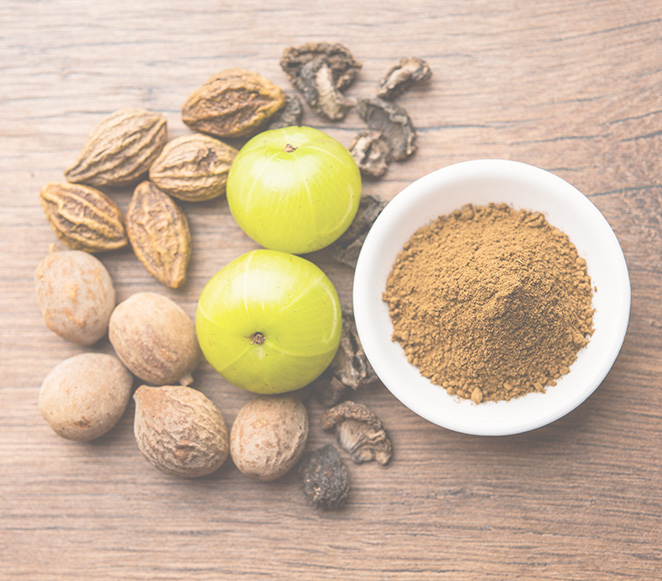
In the philosophical literature of ancient India, the etymology of the term Ama depicts an “unripe” fruit. We already see the adverse effect that Ama can bring when we relate it to the world of health in Ayurveda.
Ama is described as a thick, viscous material that lines the intestinal walls and prevents the assimilation of nutrients. This material eventually spreads throughout the body, slowly affecting organs and their functions.
In modern physiology, it is recognized that during the digestion of food, certain parts of nutrients are not properly assimilated and become so-called exogenous inert materials. Then through oxidation, these materials become antigens, harmful to the body.
Signs of Ama in the body:
The accumulation of Ama has significant consequences on health. It develops mainly in the digestive tract so recurrent intestinal disturbances are the first signs of its presence. Then, more serious problems appear: fatigue, bad breath, skin problems, aches, etc. Then the level of disturbances in the different organs leads to sleep disorders, hormonal disorders, weight gain or even a weakening of immunity. The multiplication of poor conditions contributes to the appearance of chronic diseases, even the most serious.
An essential link between Agni and Ama
Another concept in Ayurveda to consider is Agni, the Digestive Fire. Agni represents the mechanical, enzymatic, and metabolic processes of the gastrointestinal system allowing the conditioning of ingested foods into assimilable nutrients. When Agni is in full capacity, the transformation of the food bolus takes place correctly then the intestinal emunctory work takes place normally, thus the formation of Ama is almost non-existent. Conversely, any digestive disturbance causes stagnation, irritation, maceration favoring the formation of Ama.
This understanding of Agni and Ama is essential in Ayurveda, as it highlights the importance of healthy digestion to prevent the accumulation of this harmful substance which is the leaven of most diseases.
The Ayurvedic adage reminds us that: “Any remedy or treatment can eradicate the disease if it is applied in a nirama (without ama) state”.
How to avoid Ama?
- Do not consume food without feeling hungry: the feeling of hunger present in the stomach is the signal that the entire digestive system is operational to manage a new bowl of food.
- Do not heat honey above 40°C: above this temperature, its molecular structure changes and becomes material unsuitable for digestion.
- Avoid mixing ghee and honey: these two ingredients are very virtuous in Ayurveda, but mixed in equal proportions their combination is difficult for digestion.
- Do not consume food that aggravates Vikriti (current imbalance).
- Do not mix two foods with opposite characteristics, such as hot and cold or raw and cooked.
- Avoid exotic fruits or other foods that the digestive system is unfamiliar with: this can be a source of poor digestion.
- Do not break the sequential succession of digestion by a succession of food ingestion (snacking).
- Do not reheat food: each heating and cooling changes the chemistry of the food, the nitrates present in certain foods then become nitrites which are harmful to the body.
- Foods that need to be cooked to be digested by our body must be cooked correctly, such as cereals, potatoes, etc.
- Strengthen digestive capacities, Agni (see the article on Agni, the digestive fire).
- Ama also comes because of stress at the visceral level. Meditation, conscious breathing (pranayama), yoga or other daily practices play a valuable role.

How to eliminate Ama?
When Ama is already present, forceful reactivation of Agni is necessary. This is done through dietary changes, the use of detoxifying herbals, and other Ayurvedic practices aimed at restoring the strength of Agni.
The strength of ginger: freshly grated or powdered, ginger has exceptional digestive properties and is almost systematically found in Ayurvedic meals. Decoction or infusion of ginger stimulates Agni and helps eliminate Ama.

Ayurvedic plants: A multitude of detoxifying plants are named in Ayurveda.
Triphala, a combination of three fruits, is a basic detoxifier with a wide range of actions on the entire digestive system. But there are also other plants like neem, guggullu, musta, guduchi, aloe vera, gentian…
For each degree of accumulation of Ama or organ affected by it, there is a composition of plants. The right choice considers the person's constitution (Prakriti), the momentary imbalance (Vikriti) and Ama's situation.
At the change of season: to facilitate the transition from season, you must set up a few “detox” days with a balanced diet and lifestyle. This is particularly appropriate in spring to help the body shed the natural accumulations of winter. As a reaction to the cold, the body produces more adipose tissue, but in which Ama is also inserted. The spontaneous movement of the organism arriving in spring is to free itself from it.
The Panchakarma: The Panchakarma is the pinnacle of detoxification. It takes place over several days during which a program of body care, diet and rest is organized according to needs. Massages with herbal oils and other treatments prepare the body for the elimination of Ama, then for the restoration and regeneration of the dhatus (body tissues).
With Ayurveda, detox is not seen as a deprivation, but rather as a moment of regeneration.






